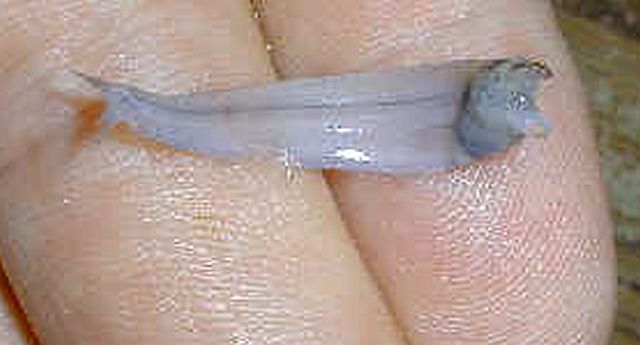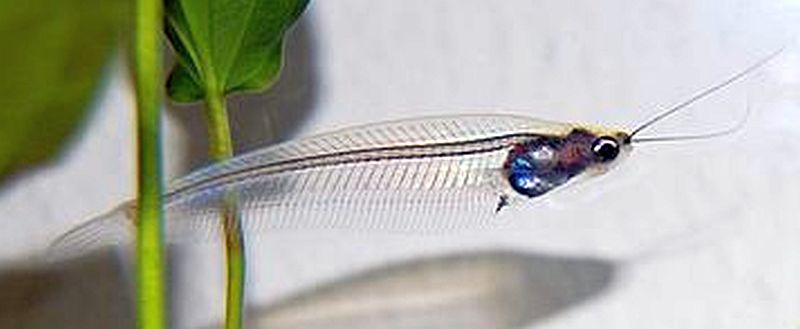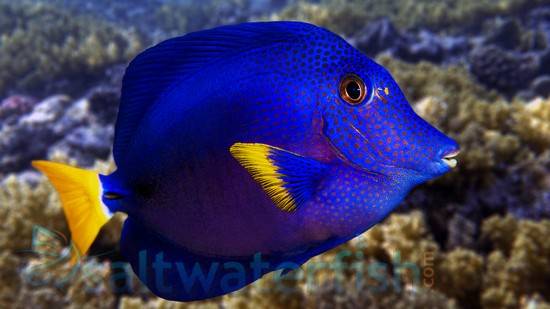The Glass Catfish (Kryptopterus vitreolus) is also known to tropical fish keeping enthusiasts as the Ghost Catfish, Phantom Catfish, Ghost Glass Cat, Indian Ghost, Ghost Fish, or Glass Cat. It is a small Asian catfish species endemic to Thailand and is the most commonly seen in tropical fish keeping circles. Kryptopterus vitreolus is found south of the Isthmus of Kra in rivers that drain into the Gulf of Thailand as well as in river basins in the Cardamom Mountains and possibly in Penang, Malaysia.
Up until 1989, the Glass Catfish (Kryptopterus vitreolus) was considered to be the same species as Kryptopterus bicirrhis, which is a larger and less frequently encountered species in the aquarium trade. Afterwards, the Ghost Catfish that was commonly seen in the aquarium trade was believed to be Kryptopterus minor but in 2013, it was determined that the Ghost Catfish was actually Kryptopterus vitreolus.
Kryptopterus minor is found solely in Borneo and is almost never, if ever available to tropical fish keeping enthusiasts in the aquarium trade.
Glass Catfish lack body pigment and are transparent. They have a slender body, an anal fin that extends almost from the head to the forked caudal fin, two long barbels, and usually only grow to about 3″ in length. Most of their organs are located towards the head and although they are transparent, they have an iridescent rainbow color when the light strikes them at the right angle.
After Glass Catfish die, their bodies turn a milky white color. There are only two other species of “glass catfish” (Kryptopterus) that have clear, transparent bodies; Kryptopterus minor and Kryptopterus piperatus (from northern Sumatra), both of which are almost never encountered in the aquarium hobby. In Southeast Asia, the Glass Catfish is a major ingredient in making some of the salty fish sauces used in Asian cooking.
Glass Catfish are a timid, non-aggressive, mid water swimming species that prefer hiding in the darker areas of the river. They are frequently collected while hiding under logs, elevated rock outcroppings, and in the shadows of overhanging vegetation in areas with a good amount of water movement.
In an aquarium environment, they need a densely planted tank with a lot of swimming area, a gentle amount of current, and some driftwood roots for shelter. A generous growth of aquatic plants is imperative to their well being, and floating plants
should also be included in their tank to filter out bright lighting. In their natural habitat they are found in small schools, and should be kept with at least 5 or 6 of their own kind in a community tank setting with other peaceful fish of the same size. They do well with the smaller tetras, Corydoras, etc.
Glass catfish are relatively delicate and are extremely sensitive to changes in water quality and pH. They do best in soft (less than 10 ° dGH), slightly acidic (pH 6.5) water, at a temperature around 77 °F. A good quality filter that provides some water movement is necessary for this species.
Although there are reports of Glass Catfish being bred in an aquarium environment, no specifics have been documented. They are egg scatters and have been bred in outdoor ponds in Southeast Asia, primarily for the aquarium hobby.
Glass Catfish in an aquarium environment are reputedly finicky eaters however, they will accept live, frozen, or freeze dried bloodworms, tubifex, brine shrimp, and mosquito larvae. They can be weaned to accept flake foods.
Glass Catfish are available for purchase when they are approximately 1-1/4″ to 3″ in size.
Minimum Tank Size: 10 gallons
Care Level: Moderate
Temperament: Peaceful
Water Conditions: 75-80° F, KH 8-12, pH 6.5-7.0
Max. Size: 3″”
Color Form: Clear
Diet: Omnivore
Compatibility: Community
Origin: Thailand
Family: Siluridae
Lifespan: 3-6 years
Aquarist Experience Level: Intermediate/Advanced



